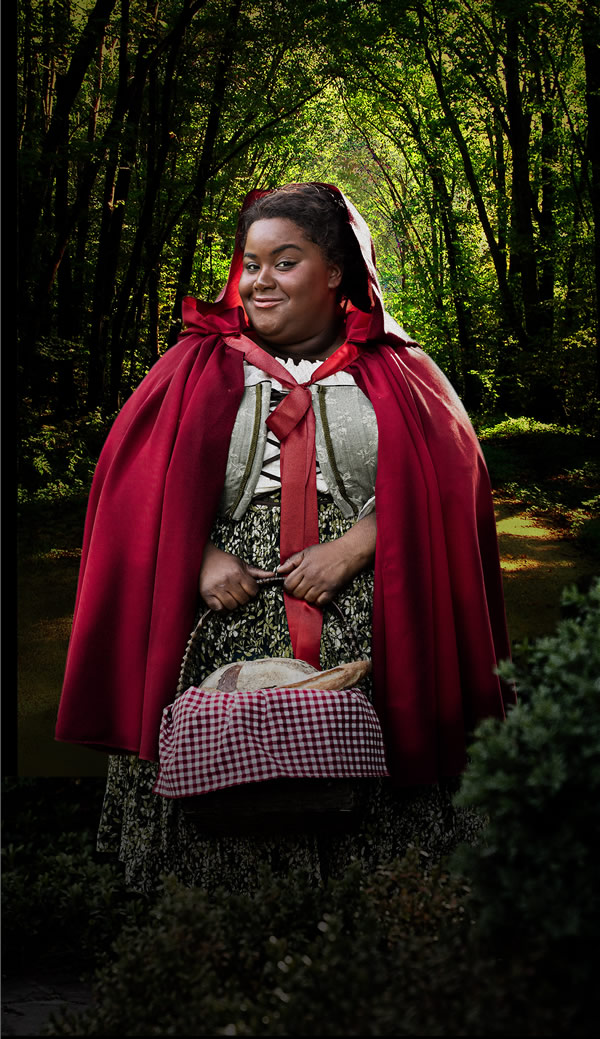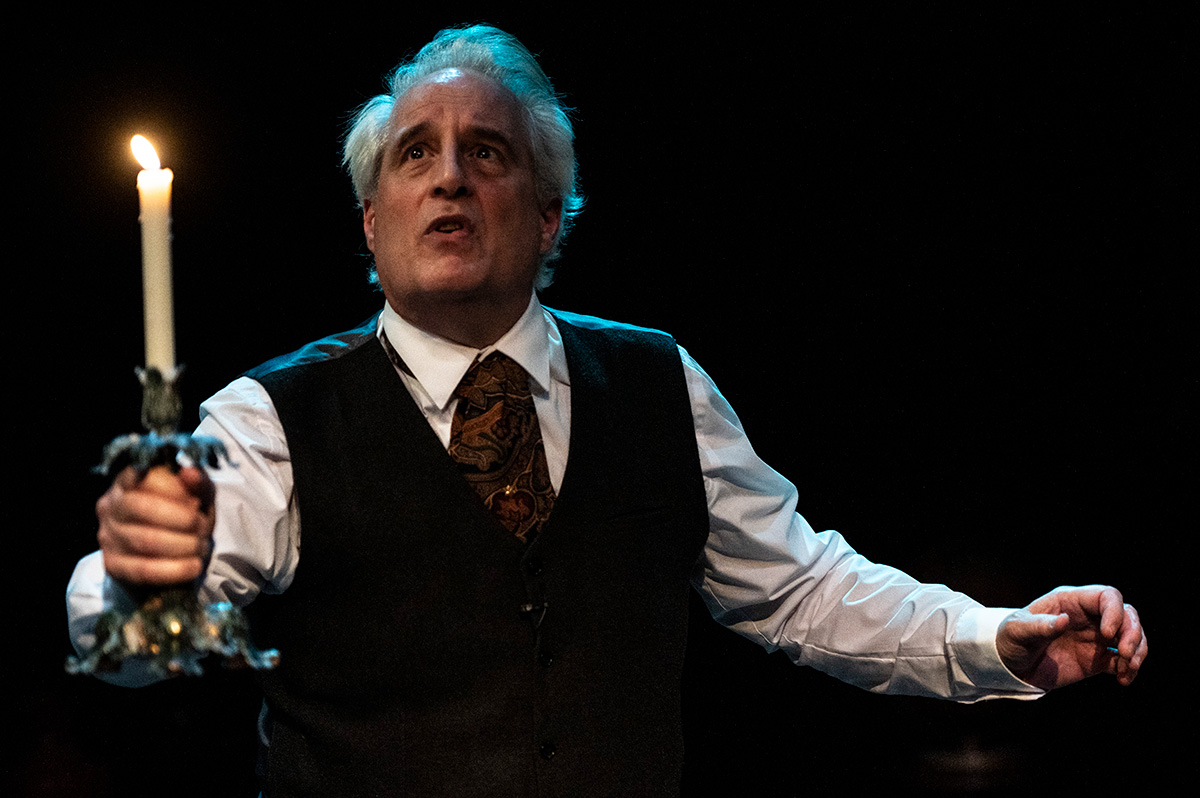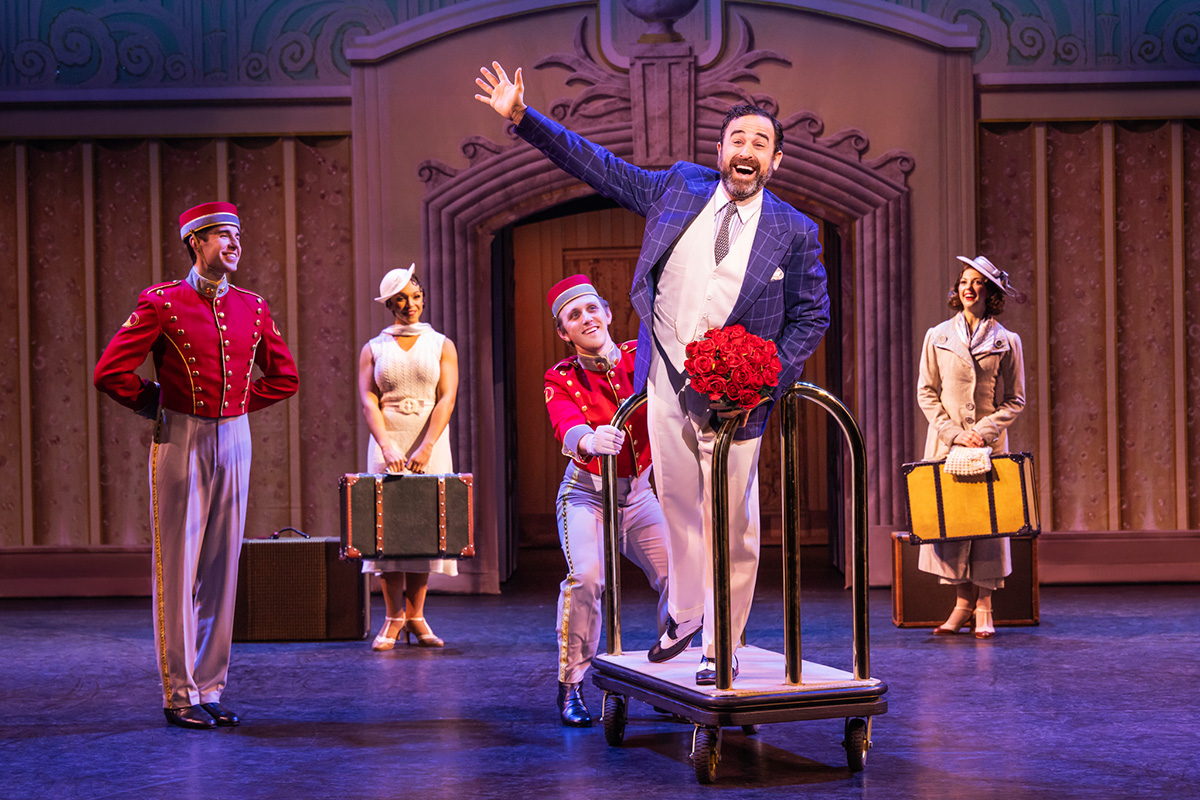Theater
SPRING ARTS 2019 THEATER: Signature’s ‘Masterpieces,’ 4615’s ‘Separate Rooms’ among highlights
As always, out actors galore slated to star in D.C.-area spring ’19 theater productions


Long considered a time of renewal, spring means getting out and about. How better to revitalize than with theater?
Out playwright Joe Calarco (“Shakespeare’s R&J”) debut his “Separate Rooms” (through March 17) at up-and-coming 4615 Theatre Company (The Highwood Theatre at 914 Silver Spring Avenue, Silver Spring, Md.). It’s a comedy about a group of friends who gather for an impromptu party following a friend’s funeral. It began as the playwright’s “Big Chill” but expanded in subsequent drafts.
Three of the play’s nine characters are gay men. Josh is the dead man’s lover and just hours after his partner’s burial he’s trying to stay afloat, Calarco says. At the party Josh meets gay character Simon, who provides solace in the way only a stranger can.
“Separate Rooms” features talented out actor Alex Mills. Jordan Friend directs. Full details at 4615theatre.com
At Shakespeare Theatre Company (610 F St., N.W.), out artistic director Michael Kahn’s finale season continues with director David Muse’s morgue-set production of “Richard the Third,” through March 10, starring Matthew Rauch as the ruthless, bloodthirsty monarch. In addition to Rauch’s nuanced turn, the large diverse cast includes standout performances by Christopher Michael McFarland as Buckingham and Sandra Shipley as the Duchess of York, Richard’s mother.
Following is Kate Hamill’s “Vanity Fair” (through March 31) based on the novel by William Makepeace Thackery. Hamill’s adaptation “harnesses the frivolity of Thackeray’s novel while recasting its (anti) heroines as complex, vibrant women.” Jessica Stone directs.
Kahn ends his esteemed STC tenure with his staging of playwright Ellen McLaughlin’s adaptation of Aeschylus’ “The Oresteia” (April 30-June 2) at Sidney Harman Hall. This only surviving trilogy in Greek tragedy “chronicles a deluge of violence that can only be stopped when society peers into its own soul and sees the depths of its complicity.” Details at shakespearetheatre.org.
Signature Theatre (4200 Campbell Ave., Arlington) presents the world premiere of “Masterpieces of the Oral and Intangible Heritage of Humanity” through April 7. Written by Heather McDonald and directed by Nadia Tass, it features out actor Holly Twyford and Felicia Curry in the story of three women trapped in a ravaged museum during a catastrophic hundred years war. It’s on them to decide what’s worth saving amid the chaos.
Next, it’s Signature’s out artistic director Eric Schaeffer’s production of “Grand Hotel” (April 2- May 19). With book by Luther Davis and music & lyrics by Robert Wright and George Forrest, the 1989 musical is based on Vicki Baum’s 1929 novel and play about love and intrigue set in luxe rooms between the wars. Baum’s story was also made into a 1932 MGM film starring Greta Garbo and Joan Crawford, among other screen luminaries.
Here, the talent-packed cast includes Helen Hayes Award-winning out actor Bobby Smith, Natascia Diaz as Grushinskaya, the Russian prima ballerina who wants to be left alone, and Kevin McAllister.
Later the world premiere of John Dempsey and Dana P. Rowe’s musical comedy “Blackbeard” (June 18-July 14) opens. Immersively set entirely on a pirate ship, the new work is staged by Eric Schaeffer and choreographed by out director/choreographer Matthew Gardiner. Details at sigtheatre.org.
Ford’s Theatre (511 10 St., N.W.) marks springtime with a production of genius out composer Stephen Sondheim’s dark comedy “Into the Woods” (March 5-May 22) based on classic fairytales. Singing Sondheim’s gorgeous Tony Award-winning score is a terrific cast that includes out actor Jade Jones as Little Red Ridinghood, and Evan Casey as the Baker and Awa Sal Secka as the Baker’s Wife. Peter Flynn directs. Details at fords.org.

At Studio Theatre (1501 14th St., N.W.), out director José Zayasis stages playwright Hilary Bettis’ “Queen of Basel” (March 6-April 7), an exploration of class, power and race set against Miami’s annual weeklong arts happening for the rich and/or fabulous. Details at studiotheatre.org.
Theater J (temporarily at Georgetown University’s Davis Performing Arts Center at 37th & O Streets, N.W.) presents “The Jewish Queen Lear” (March 13-April 17) staged by the company’s out artistic director Adam Immerwahr. A classic of Yiddish theater written in 1898, playwright Jacob Godin’s story focuses on Mirele Efros, a wealthy widow obsessed with finding the right wife for her son. Details at theaterj.org
The Kennedy Center presents “The Watsons Go to Birmingham–1963” (March 15-24) with Justin Weaks. This musical adaptation of Christopher Paul Curtis’ celebrated book recounts an African-American family’s bonding experiences during a tense time in American history.
Also, at the Kennedy Center, for one night only on April 6, it’s “Triptych (Eyes of One on Another),” the first theatrical performance granted permission to explore and integrate the work of Robert Mapplethorpe, the acclaimed and sometimes controversial gay photographer who died from AIDS in 1989. The piece brings together choral ensemble Roomful of Teeth, vocalist-violinist-composer Caroline Shaw, and the poetry of Patti Smith and Essex Hemphill, with projections of Mapplethorpe’s breathtaking images.
More Kennedy Center offerings include legendary out composer Jerry Herman’s chestnut “Hello, Dolly!” (June 4- July 7). This time it’s the national tour of the revival that famously featured Bette Midler about a beloved matchmaker. Broadway legend Betty Buckley stars.
“Falsettos” (June 11-23), William Finn and James Lapine’s musical about a complicated New York City family, and in part how AIDS affects them, will be staged in an all new production from Lincoln Center. Details at kennedy-center.org
At Keegan Theatre (1742 Church St., N.W.), “Hands on a Hardbody” (March 9-April 6) is up next. It’s a deceptively titled, Texas-set musical adapted by out playwright Doug Wright (“I Am My Own Wife”) from the same-named 1997 documentary film about an unconventional endurance contest. The large cast includes out actors Oscar Ceville and Patrck M. Doneghy. Details at keegantheatre.com.
D.C.’s company dedicated to the LGBT experience, Rainbow Theatre Project (D.C. Arts Center, 2438 18th St., N.W.), presents “Clothes for a Summer Hotel” (April 4-28), Tennessee Williams haunting work about the last days of F. Scott Fitzgerald and Zelda Fitzgerald. Out director Greg Stevens directs. Details at rainbowtheatreproject.org.
Olney Theatre Center (2001 Olney-Sandy Spring Rd., Olney, MD) presents Tony Award-winning playwright Sam Ludwig’s Ken Ludwig’s farce “Comedy of Tenors” (April 10-May 12). The cast features talented local favorite Emily Townley opposite out Broadway actor John Treacy Egan.
And in May at Olney comes “Mary Stuart” (May 8-June 9) based on Friedrich Schiller’s widely read 1800 take on the ill-fated royal. Adapted by Olney’s out artistic director Jason Loewith and company, and staged by Loewith, it explores the chilling rivalry between England’s Elizabeth I and her Scottish cousin. Details at olneytheatre.org.
For out actor Jaysen Wright, spring is Arena Stage (1101 6th St., S.W.) where he’ll be performing in the new musical “Jubilee” (April 26-June 2) written and directed by Tazewell Thompson. Based on the real-life Fisk Jubilee Singers who shattered racial barriers in the U.S. and abroad, Thompson’s new a cappella musical boasts an impressive three dozen songs. Details at arenastage.org.
1st Stage (1524 Spring Hill Rd., Mclean, Va.) presents Carson McCullers’ “The Member of the Wedding” (May 9-June 2) directed by Cara Gabriel. A beautiful coming-of-age story set in small-town Georgia, the play — adapted from the bisexual writer’s same-titled novella — is an expression of McCullers’ enduring longing to connect. Details at 1ststagetysons.org
GALA Hispanic Theatre (3333 14th St., N.W.) presents the U.S. premiere of “FAME, The Musical en español” (May 9- June 9). Luis Salgado, who helmed GALA’s Helen Hayes Award-winning “In the Heights en español,” directs and choreographs this tale of tears and triumph at a performing arts high school. Details at galatheatre.org.
Helen Hayes Award-winning out actor Philip Fletcher is tackling the role of King Edward in Shakespeare’s gory “Richard III” (May 15-June 16) at the much-admired movement-based company Synetic Theater (1800 South Bell Street, Chrystal City, Va.) where he’s a longtime performer. Details at synetictheater.org.
Later this Spring, Justin Weaks also appears alongside Tim Getman and Kate Eastwood Norris in Rajiv Joseph’s “Describe The Night” (May 27-June 23) at Woolly Mammoth Theatre Company (641 D St., N.W.). The Obie Award-winning play is comprised of stories spanning 90 years of Russian history. Excellent out director John Vreeke directs. Details at woollymammoth.net.
Round House Theatre (housed temporarily at The Lansburgh Theatre, 450 7 St., N.W.) presents Lucas Hnath’s “A Doll’s House, Part 2” (June 5-30), a clever sequel to Ibsen’s 1879 proto-feminist classic. The cast includes out actor Holly Twyford, Nancy Robinette and Kathryn Tkel. Nicole A. Watson directs. Details at roundhousetheatre.org.
Theater
D.C. theater scene has something for everyone this holiday season
‘Nutcracker,’ ‘A Christmas Carol,’ and much more

With its familiar music, yuletide imagery, and storytelling, theater can be a big part of the holidays. Add to that making memories and theater tickets wrapped as presents under the tree, and it’s a seasonal no brainer.
Folger Theatre presents “Resplendent Joy: Christmas Traditions from Spain and Portugal” (Dec. 5-14); the marvelous Folger Consort will perform early Spanish Christmas carols and traditional holiday music from early modern Spain and Portugal: folger.edu/resplendent
At Round House Theatre, playwright Sam Holcroft’s “Rules for Living” (Dec. 3-Jan. 4) makes its U.S. premiere. The darkly funny holiday comedy was a hit in London and is now hoping to repeat that success with a version tailored for the states. The seven-person cast includes versatile actors Naomi Jacobson and real-life spouse John Lescault. Ryan Rillette directs. roundhousetheatre.org
Theatre J presents “Chanukah in the Dark” (Dec. 6-21), an hour-long play ideal for ages five and up. “When the lights go out during Chanukah, Max and family begin sharing songs, stories, and traditions — only to discover the lights they needed and the miracles they searched for were in their midst all along.” edcjcc.org
The Cathedral Choral Society’s “Joy of Christmas” (Dec. 13-14) presents a wonderful program of carols and beloved holiday favorites at the festively decorated National Cathedral. The program features Seraph Brass, organist Edward Hewes, Carillonneur Edward M. Nassor, percussionist Mary La Blanc of “The President’s Own” U.S. Marine Band, and the Eastern Concert Choir from Eastern Senior High School. Cathedralchoralsociety.org
With “The Holiday Show,” (Dec. 13, 14, and 20), the Gay Men’s Chorus returns to entertain audiences with its annual and most popular show.
This year the holiday extravaganza is bigger than ever at historic Lincoln Theatre with new, soulful arrangements of favorite holiday carols: “The reindeer will be high-kicking and the snowflakes will sparkle. Songs include “O Holy Night,” “Rudolph the Red Nosed Reindeer,” “Let It Snow,” “We Wish You the Merriest,” and “Go Tell It on the Mountain.’” gmcw.org
At Olney’s intimate Mulitz-Gudelsky Theatre Lab, out actor Michael Russotto is back for the holiday season in his solo show “Christmas Carol: A Ghost Story of Christmas” (through Dec. 28). The talented Russotto portrays nearly 50 different characters from the Charles Dickens classic, that proves “funnier and far more relevant than you might imagine.” Olneytheatre.org
Also on holiday offer in the DMV are a jolly bunch of musical chestnuts as well as reliable Christmas crowd-pleasers.
Included on the roster is Olney Theatre’s production of Jerry Herman’s “Hello, Dolly!” (through Jan. 4) starring the mega-talented Nova Y. Payton. Based on the play “The Matchmaker” by famed gay playwright Thornton Wilder, the musical has proved a vehicle for many a diva including Carol Channing, Pearl Bailey, Bette Midler, and Barbra Streisand. Now Payton dons the mantle and the buzz is good.
Another beloved musical is “Fiddler on the Roof” (through Jan. 25), the story of Tevye, a poor Jewish milkman, his family and their tight-knit community who honor tradition while contending with pogroms in Czarist Russia. Currently being performed intimately in the round at Signature Theatre in Arlington and directed by Joe Calarco, the large cast features actors Douglas Sills, Chrisopher Bloch, and terrific out actor Jake Loewenthal as the poor tailor Motel Kamzoil, all singing Broadway favorites like “Sunrise, Sunset” “If I Were a Rich Man” and “Matchmaker.” sigtheatre.org
At Shakespeare Theatre Company’s Harman Hall is Frank Loesser’s “Guys and Dolls” (through Jan. 4). Based on tales from famed American journalist Damon Runyon, the show focuses on two overlapping love stories set in Depression-era Times Square. The terrific score includes songs like “Luck Be a Lady,” “Sit Down, You’re Rockin’ the Boat,” “A Bushel and a Peck,” and more songs you’ll know. Directed by Francesca Zambello and choreographed by Joshua Bergasse.
The cast includes Julie Benko, Lamont Brown, and Holly Twyford as General Matilda B. Cartwright, which is reason enough to buy a ticket. shakespearetheatre.org
And for hardcore traditionalists there’s the Washington Ballet’s “The Nutcracker” (through Dec. 29) with its balletic magic at the charming gilded Warner Theatre. The beloved production of Tchaikovsky’s ballet, here set in 1882 Georgetown, features a retinue of agile partiers, children, soldiers, rats, and notable figures from American history. washingtonballet.org
And last but hardly least, historic Ford’s Theatre presents “A Christmas Carol” (through Dec. 31), an enduring Washington tradition since I was youngish. Conceived by Michael Baron, this charming Dickens’ moneymaker again spotlights Craig Wallace as miserly Ebenezer Scrooge who after a night of ghostly visits, rediscovers Christmas joy. Fords.org
Theater
New take on ‘Some Like It Hot’ offers diverse casting
National Theatre production includes non-binary character

‘Some Like It Hot’
Nov. 25 – Dec. 7
The National Theatre
1321 Pennsylvania Ave., N.W.
Tickets starting at $67
Broadwayatthenational.com
For more than a year, out actor Edward Juvier has been part of the national tour of “Some Like It Hot,” the musical adaption of the 1959 classic comedy starring Marilyn Monroe and written and directed by Billy Wilder.
Juvier, 49, plays Osgood Fielding III, a cheery millionaire in Depression-era America.
With music by Marc Shaiman, lyrics by Scott Wittman and Shaiman, and a book by Matthew López and Amber Ruffin, the 2022 musical is quite different as well with diverse casting, increasingly complicated backstories, and a non-binary character (Daphne).
A talented tenor and Houston native, Juvier is a Cuban American who’s been working in musical theater since graduating from the Boston Conservatory in 2000.
“I personally love touring,” says Juvier. “I like the life on the road and visiting these old theater houses across the country. Seeing the locals that I remember and my friends and family that live all over. For me, a transient life is great. Maybe not so great for others.”
Early in his career, he toured with “Phantom of the Opera” for six years. He began in the ensemble and covered two principal roles, and moved to swing which gave him the longevity covering 11 different roles in that show, a life-changing gig that he remembers fondly.
WASHINGTON BLADE: As a gay actor touring in a hot musical with some queer themes do you feel that you make an impact?
EDWARD JUVIER: Oh yeah, it’s important for queer people to see representation on stage. Our version of the show is a sneak attack; it doesn’t hit you over the head with themes. Seeing an old story that takes a turn where you’re left to accept what’s happening onstage and by that time, you’re in love and rooting with the characters. You feel it from the audiences and we play some of the reddest of states.
Queer, trans, nonbinary people meet us at the stage door in tears thanking us for the representation. They didn’t even know when they came to the show that they’re going to see something with such an affirming message to their lives, and they’re thrilled when they find that out.
BLADE: How were you drawn into musical theater?
JUVIER: I was lucky that my Texas high school made annual trips to New York to see Broadway shows. On one trip, I remember seeing “Will Rogers Follies,” I felt like Keith Carradine was looking and talking right to me.
And the next day, we saw “Falsettos,” the original production. After seeing those two very different shows it was as if I blasted off into the Broadway world.
BLADE: Did “Falsettos,” a musical about AIDS, resonate with you as young gay student?
JUVIER: Absolutely. It shook me to the core.
BLADE: Has being gay made you a better actor?
JUVIER: I think what makes a great actor is somebody who has enormous empathy, able to put themselves in someone else’s shoes, and what better than a queer artist to be able to empathize.
I came out pre- “Will and Grace.” A different time to be coming out than it is now, which shows immense progress but also put us through challenges. It’s been a part of my journey.
I’m lucky to have the best, most supportive family. No Trumpers to deal with when I go home for the holidays. So, I’m grateful for that especially at this time of year.
BLADE: How do you approach a comic character like Osgood.
JUVIER: I approach him with honesty and simplicity and try to get out of the way of cheap jokes.
When I’m feeling that I’m pushing myself I remind myself to just say the words. I think the musical is so beautifully crafted in a way to brings the show to a new audience. Changes aren’t a diss on the original but the world has changed.
BLADE: Are you a big fan of the original?
JUIVIER: I respect the original. It’s been with me all my life especially being a queer artist. We grew up watching “Some Like It Hot.” This takes old themes and jokes that don’t land so well and brings it to a new audience.
Particularly with my role played originally and so brilliantly by famed comedian Joe E. Brown. In the movie he’s not a multi-dimensional character. He’s more of an old, rich pervy guy. That’s just how it was back then. And I’ve had the great privilege to play him differently.
Theater
Gay, straight men bond over finances, single fatherhood in Mosaic show
‘A Case for the Existence of God’ set in rural Idaho

‘A Case for the Existence of God’
Through Dec. 14
Mosaic Theater Company at Atlas Performing Arts Center
1333 H St,, N.E.
Tickets: $42- $56 (discounts available)
Mosaictheater.org
With each new work, Samuel D. Hunter has become more interested in “big ideas thriving in small containers.” Increasingly, he likes to write plays with very few characters and simple sets.
His 2022 two-person play, “A Case for the Existence of God,” (now running at Mosaic Theater Company) is one of these minimal pieces. “Audiences might come in expecting a theological debate set in the Vatican, but instead it’s two guys sitting in a cubicle discussing terms on a bank loan,” says Hunter (who goes by Sam).
Like many of his plays, this award-winning work unfolds in rural Idaho, where Hunter was raised. Two men, one gay, the other straight (here played by local out actors Jaysen Wright and Lee Osorio, respectively), bond over financial insecurity and the joys and challenges of single fatherhood.
His newest success is similarly reduced. Touted as Hunter’s long-awaited Broadway debut, “Little Bear Ridge Road” features Laurie Metcalf as Sarah and Micah Stock as Ethan, Sarah’s estranged gay nephew who returns to Idaho from Seattle to settle his late father’s estate. At 90 minutes, the play’s cast is small and the setting consists only of a reclining couch in a dark void.
“I was very content to be making theater off-Broadway. It’s where most of my favorite plays live.” However, Hunter, 44, does admit to feeling validated: “Over the years there’s been this notion that my plays are too small or too Idaho for Broadway. I feel that’s misguided, so now with my play at the Booth Theatre, my favorite Broadway house, it kind of proves that.”
With “smaller” plays not necessarily the rage on Broadway, he’s pleased that he made it there without compromising the kind of plays he likes to write.
Hunter first spoke with The Blade in 2011 when his “A Bright Day in Boise” made its area premiere at Woolly Mammoth Theatre. At the time, he was still described as an up-and-coming playwright though he’d already nabbed an Obie for this dark comedy about seeking Rapture in an Idaho Hobby Lobby.
In 2015, his “The Whale,” played at Rep Stage starring out actor Michael Russotto as Charlie, a morbidly obese gay English teacher struggling with depression. Hunter wrote the screenplay for the subsequent 2022 film which garnered an Oscar for actor Brendan Frazier.
The year leading up to the Academy Awards ceremony was filled with travel, press, and festivals. It was a heady time. Because of the success of the film there are a lot of non-English language productions of “The Whale” taking place all over the world.
“I don’t see them all,” says Hunter. “When I was invited to Rio de Janeiro to see the Portuguese language premiere, I went. That wasn’t a hard thing to say yes to.”
And then, in the middle of the film hoopla, says Hunter, director Joe Mantello and Laurie (Metcalf) approached him about writing a play for them to do at Steppenwolf Theatre in Chicago before it moved to Broadway. He’d never met either of them, and they gave him carte blanche.
Early in his career, Hunter didn’t write gay characters, but after meeting his husband in grad school at the University of Iowa that changed, he began to explore that part of his life in his plays, including splashes of himself in his queer characters without making it autobiographical.
He says, “Whether it’s myself or other people, I’ve never wholesale lifted a character or story from real life and plopped it in a play. I need to breathing room to figure out characters on their own terms. It wouldn’t be fair to ask an actor to play me.”
His queer characters made his plays more artistically successful, adds Hunter. “I started putting something of myself on the line. For whatever reason, and it was probably internalized homophobia, I had been holding back.”
Though his work is personal, once he hands it over for production, it quickly becomes collaborative, which is the reason he prefers plays compared to other forms of writing.
“There’s a certain amount of detachment. I become just another member of the team that’s servicing the story. There’s a joy in that.”
Hunter is married to influential dramaturg John Baker. They live in New York City with their little girl, and two dogs. As a dad, Hunter believes despite what’s happening in the world, it’s your job to be hopeful.
“Hope is the harder choice to make. I do it not only for my daughter but because cynicism masquerades as intelligence which I find lazy. Having hope is the better way to live.”
-

 The White House4 days ago
The White House4 days ago‘Lavender Scare 2.0’: inside the White House’s campaign against LGBTQ federal employees
-

 District of Columbia4 days ago
District of Columbia4 days agoActivists praise Mayor Bowser’s impact on city, LGBTQ community
-

 a&e features4 days ago
a&e features4 days agoMeet Mr. Christmas
-

 Puerto Rico3 days ago
Puerto Rico3 days agoPuerto Rico’s largest LGBTQ organization struggling amid federal funding cuts




















